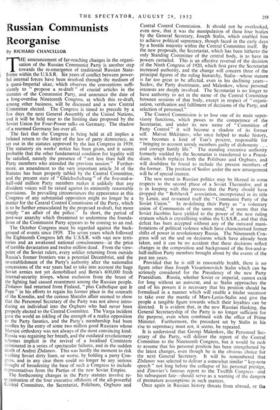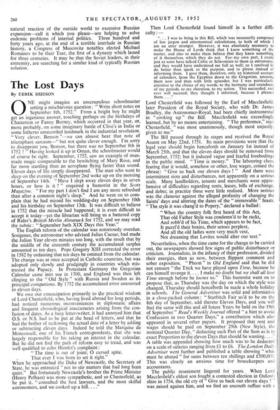Russian Communists Reorganise
By RICHARD CHANCELLOR
HE announcement of far-reaching changes in the organi- sation of the Russian Communist Party is another step towards the re-emergence of traditional Russian State- forms within the U.S.S.R. Six years of conflict between power- ful internal forces have been resolved through the medium of a quasi-Imperial ukaz,- which observes the conventions suffi- ciently to " propose a re-draft " of crucial articles in the statutes of the Communist Party, and announce the date of a long-overdue Nineteenth Congress, at which this re-draft, among other business, will be discussed and a new Central Committee elected. The Congress is timed to precede by a few days the next General Assembly of the United Nations, and it will be held near to the limiting date proposed by the Soviet Union for Four-Power talks on Germany. The shadow of a rearmed Germany lies over all.
The fact that the Congress is being held at all implies a belated return to the letter of the law of party democracy, as set out in the statutes approved by the last Congress in 1939. The statutory six weeks' notice has been given, and it seems probable that the other fundamental condition for legality will be satisfied, namely the presence of " not less than half the Party members who attended the previous session." Further- more, an amendment to the very important article 34 of the Statutes has been properly tabled by the Central Committee, and the present state of " Gleichschaltung " of the five-and-a- half-odd million Party members makes it unlikely that any dissident voices will be raised against its eminently reasonable provisions. In prevailing circumstances the appearance at this Congress of any substantial opposition might no longer be a matter for the Central Control Commission of the Party, which is to be further emasculated by the proposed re-draft, but more simply " an affair of the police." In short, the period of post-war anarchy which threatened to undermine the founda- tions of the Communist Party appears to be coming to an end.
The October Congress must be regarded against the back- ground of events since 1939. The seven years which followed the Eighteenth Congress left the U.S.S.R. with vast new terri- tories and an awakened national consciousness—at the price of terrible devastation and twelve million dead. From the view- point of the Soviet rulers, every soldier returning from outside Russia's former frontiers was a potential Decembrist, and the re-establishment of the Party's authority after the nationalist concessions of the war years had to take into account the huge Soviet armies not yet demobilised and Beria's 600,000 fresh internal-security troops, whose exclusion from the brunt of the fighting had caused resentment among the Russian people. Zhdanov had returned from Finland, " plus Catholique que le Pape " in his efforts to regain his former place in the counsels of the Kremlin, and the curious Shatalin affair seemed to show that the Personnel Secretary of the Party was not above intro- ducing an individual into the Orgburo who had never been properly elected to the Central Committee. The Varga incident gave the world an inkling of the strength of a realist opposition to the Party fanatics, and the Party's membership had been swollen by the entry of some two million good Russians whose Marxist orthodoxy was not always of the most convincing kind. Russia was regaining her breath, and the outdated revolutionary schemes implicit in the revival of a localised Comintern culminated in-a series of spectacular failures, and in the sudden death of Andrei Zhdanov. This was hardly the moment to risk washing Soviet dirty linen, or worse, by holding a party Con- gress, and in any case there could no longer be any serious thought of broadening the base of such a Congress to include representatives from the Parties of the new Soviet Empire.
The forthcoming changes in the Party statutes involve re- organisation of the four executive offshoots of the all-powerful Central Committee, the Secretariat, Politburo, Orgburo and Central Control Commission. It should not be overlooked, even now, that it was the manipulation of these four bodies by the General Secretary, Joseph Stalin, which enabled him to achieve political supremacy, though faced in the early days by a hostile majority within the Central Committee itself. By the new proposals, the Secretariat, which has been hitherto the only Standing Committee of the central body, is to have its powers curtailed. This is an effective reversal of the decision of the Ninth Congress of 1920, which first gave the Secretariat increased authority, and the change will concern three of the principal figures of the ruling hierarchy, Stalin—whose stature is far too great to be affected, even in his declining years- Suslov, the Party doctrinaire, and Malenkov, whose personal interests are deeply involved. The Secretariat is no longer to have authority to act in the name of the Central Committee between sessions of that body, except in respect of " organi- sation, verification and fulfilment of decisions of the Party, and selection of personnel."
The Control Commission is to lose one of its main super- visory functions, which passes to the competence of the Secretariat, and under its new name of " Committee of Party Control " it will become a shadow of its former self. Matvei Shkiriatov, who once helped to make history, now becomes a kind of Tsar's proctor, responsible for " bringing to account unruly members guilty of dishonesty . . . and corrupt family life." The standing executive authority formerly wielded by the Secretariat is transferred to a Praesi- dium, which replaces both the Politburo and Orgburo, and will doubtless be found to include the present members of the former. The position of Suslov under the new arrangement will be of special interest.
The new trend in Russian politics may be likened in some respects to the second phase of a Soviet Thermidor, and it is in keeping with this process that the Party should have dropped the " Bolshevik " association, incorporated in its title by Lenin, and re-named itself the " Communist Party of the Soviet Union." In re-defining their Party as " a voluntary union of Communists of the same mind," it seems that the Soviet Jacobins have yielded to the power of the new ruling stratum which is crystallising within the U.S.S.R., and that this defeat has been accepted without any of the outward mani- festations of political violence which have characterised former shifts of power in revolutionary Russia. The Nineteenth Con- gress will set the seal on decisions which have already been taken, and it can be no accident that these decisions reflect changes in the composition and background of the five-and-a- half-million Party members brought about by the events of the past ten years.
Provided that he is still in reasonable health, there is no figure other than Joseph Vissarionovitch Stalin which can be seriously considered for the Presidency of the new Party Praesidium. Russia, whether Soviet or imperial, cannot exist for long without an autocrat, and as Stalin approaches the end of his powers it is necessary that his position- should be formalised in a manner which will enable a titular successor to take over the mantle of Marx-Lenin-Stalin and give the people a tangible figure towards which their loyalties can be directed. It is evident that, in the new Russian thinking, the General Secretaryship of the Party is no longer sufficient for the purpose, even when combined with the office of Prime Minister. Furthermore, the precedent set by Stalin in his rise to supremacy must not, it seems, be repeated.
It is understood that Georgi Malenkov, the Personnel Sec- retary of the Party, will deliver the report of the Central Committee to the Nineteenth Congress, but it would be rash to assume that his personal position has been strengthened by the latest changes, even though he is the obvious choice for the next General Secretary. It will be remembered that Zhdanov was selected to deliver a somewhat similar " key-note speech " not long before the collapse of his personal prestige, and Zinoviev's famous report to the Twelfth Congress—and his subsequent fate—should serve as a warning of the dangers of premature assumptions in such matters.
Once again in Russian history threats from abroad, or tho natural reaction of the outside world to excessive Russian expansion—call it which you please—are helping to solve endemic problems of internal politics. Three hundred and forty years ago, at the end of a terrible interlude in Russian history, a Congress of Muscovite notables elected Michael Romanov to be their Tsar, the first of a dynasty which lasted for three centuries. It may be that the Soviet leaders, in their extremity, are searching for a similar kind of typically Russian solution.



































 Previous page
Previous page